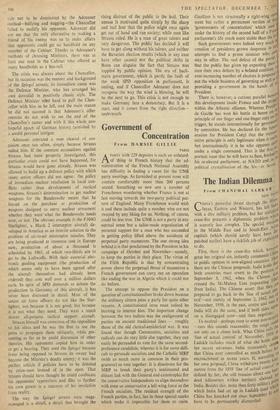Government of Concentration
From DARSIE GILLIE PARIS APARTY with 229 deputies is such an unheard- of thing in French history that the ad- ministration of the French National Assembly has difficulty in finding a room for the UNR party meetings. As furnished at present none will contain comfortably more than 200 persons seated. Something so new sets a number of Frenchmen wondering whether France is not at last moving towards the two-party political pat- tern of England. Many Frenchmen would wish it and these include quite a number who are not swayed by any liking for us. Nothing, of course, could be less true. The UNR is not a party in any normal sense but a tailor-made organisation of personal support for a man who has succeeded in getting policy lifted above the accidents of perpetual party manoeuvre. The one strong idea behind it is that proclaimed by the President in his campaign of October and November—namely, to keep the parties in their place. The virtue of the Fifth Republic is that by concentrating power above the perpetual threat of manoeuvre a French government can carry out an operation like ending the war in Algeria which it could not do before.
The attempt to oppose the President on a question of constitutionalism broke down because the ordinary citizen joins a party for quite other reasons. A constitutional issue must indeed be burning to interest him. The important change between the two ballots was the realignment of parties on ancient traditional lines — roughly those of the old clerical-anticlerical war. It was found that though Communists, socialists and radicals can do very little else together, they can easily be persuaded to vote for the same second- preference candidate, whereas it is far more diffi- cult to persuade socialists and the Catholic MRP (with so much more in common in their pro- gramme) to vote together. It is disastrous for the MRP to break their party's sentimental and distant link with the General and catastrophic for the conservative Independents to align themselves with even so conservative a left-wing force as the French socialists. The residual strength of the French parties, in fact, lies in those special marks which make it impossible for them to unite. Gaullism is not structurally a right-wing tM ment but rather a permanent version of 111°15 'governments of concentration' which used make the history of the second half of a Fre° parliament's life much more stable than the Ors, Such governments were indeed very muchlr, creation of presidents grown desperate in tbc: attempts to find a prime minister who cow', stay in office. The real defeat of the Parries,: that the public has given up expecting thenl: cure their own defects by a belated coalition, At ever-increasing number of electors is prepared1 put the whole business of governing as well as° providing a government in the hands of Ell President. • There is. howeNer, a curious parallel betweei this development inside France and the straggi within the Atlantic alliance. Whereas Preside de Gaulle has won his battle at home on principle of one finger and one finger only ein tli trigger, he stands internationally for governoleoi by committee. He has declared (in the funer oration for President Coty) that the reptes!o, ,, tative principle is only legitimate when it ant; but internationally it is he who opposes 0.101, under a single command. That is the firs1',114 portant issue that he will have to face, backed b'e his re-elected parliament, at NATO and in' I political crystallisation of the Six—or Seven'






































 Previous page
Previous page